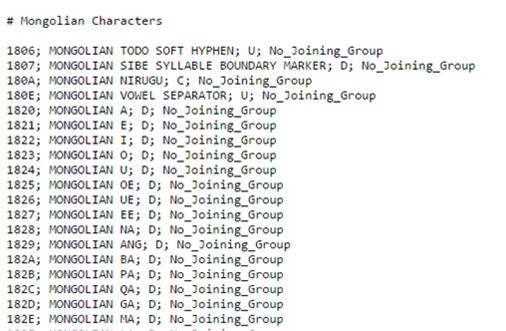- From: Andrew West <andrewcwest@gmail.com>
- Date: Mon, 9 Nov 2015 16:53:17 +0000
- To: Greg Eck <greck@postone.net>
- Cc: "public-i18n-mongolian@w3.org" <public-i18n-mongolian@w3.org>
- Message-ID: <CALgEMhzcpGWvWs6KXLS34vWckkJnw0XWhK9CKNkACWoNVNQ9gw@mail.gmail.com>
Hi Greg, Personally I am not convinced that either of these two characters should act as letters and should have letter-like shaping behaviour, so if you were to propose changing the general category of these characters from Po to Lo I would like to see a separate document giving justification for the changes and examples of how the current properties are not ideal, and how changing them would be beneficial (of course I have nothing to do with the UTC, and Michel and others on the UTC may be happy to simply take your word that the properties for these two characters need to be changed). Best wishes, Andrew On 9 November 2015 at 15:57, Greg Eck <greck@postone.net> wrote: > Richard, Andrew, > Regarding the U+1807 / U+180A then … > We should recommend a change in the ArabicShaping.txt file to be "D" for > dual-joining for the U+180A? > We should also recommend that the General Property for both U+1807 as well > as U+180A be changed from "Punctuation" to "Letter"? > Greg > > > ≫≫> > From: Richard Wordingham [mailto:richard.wordingham@ntlworld.com > <richard.wordingham@ntlworld.com>] > Sent: Wednesday, October 28, 2015 9:33 AM > Subject: Re: U+180A Nirugu > > > A good rendering engine for OpenType will refuse to select a final form > for NIRUGU on the basis of it being in final position. The UCD data file > ArabicShaping.txt records it as having the value 'join_causing' for its > Joining_Type, which means that characters on either side of it might change > shape, but it itself won't. To get NIRUGU to change shape in final > position, its Joining_Type needs to be changed to Dual_Joining. > > I fear that renderers may hard-wire this property, rather than getting if > from their usual source of Unicode properties. > > Richard. > ≫≫≫ > From a Unicode perspective anything that is encoded is a "character", so > obviously Nirugu and Sibe syllable boundary marker are by definition both > characters. I guess what you mean is that they both act as letters. > However, as both these characters have a Unicode general property of "Po" > (Punctuation, other), there may be a problem with treating them as letters, > with positional forms and FVS variants > -- I don't know if there is a problem, but am just flagging this as a > potential issue to be taken into consideration. > > Andrew > >>>>> > >
Attachments
- image/jpeg attachment: Picture__Device_Independent_Bitmap__1.jpg

Received on Monday, 9 November 2015 16:54:06 UTC